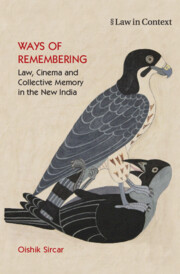Book contents
- Frontmatter
- Dedication
- Contents
- List of Figures
- Acknowledgements
- List of Abbreviations
- 1 Law and the Aesthetics of Atrocity
- 2 A Jurisprudential-Aesthetic Approach
- 3 The Best Bakery Judgments: Aesthetics of Judicial Memory
- 4 Bollywood’s Law: Cinematic Justice and Collective Memory
- 5 ‘As They Ought’
- Notes
- Glossary
- Bibliography
- Index
1 - Law and the Aesthetics of Atrocity
Published online by Cambridge University Press: 30 April 2024
- Frontmatter
- Dedication
- Contents
- List of Figures
- Acknowledgements
- List of Abbreviations
- 1 Law and the Aesthetics of Atrocity
- 2 A Jurisprudential-Aesthetic Approach
- 3 The Best Bakery Judgments: Aesthetics of Judicial Memory
- 4 Bollywood’s Law: Cinematic Justice and Collective Memory
- 5 ‘As They Ought’
- Notes
- Glossary
- Bibliography
- Index
Summary
It is when we think of the world the aesthetic of indifference might bring into being that we recognize the urgency of remembering the stories we have not written.
For several weeks in the early months of 2002, a pogrom singularly targeting Muslims was executed in the western Indian state of Gujarat. The violence resulted in deaths numbering in the thousands, egregious forms of sexual harm against women, massive displacements and loss of property, hearth and home. ‘Gujarat 2002’, as the pogrom has come to be popularly called, is independent India's most litigated and mediatised event of anti-minority mass atrocity. In the two decades since 2002, there has been much contestation over memory and forgetting related to the pogrom, played out in multiple sites such as litigation, films, literature, art, reportage, the economy and, of course, electoral politics. Of these sites, this book engages with judgments and films, by far the most ‘publicly available commemorative symbols, rituals, and technologies’ of collective memory of the pogrom.
The pogrom's legal and cinematic representations continue to provoke debates regarding state impunity, minority rights, liberalism, justice and the very meaning of India as a secular, constitutional democracy. Central to these post-pogrom debates is a concern with collective memory: the ways in which the pogrom and its aftermath are remembered through ‘shared meanings’ in public discourse, how these memories are invoked through ‘circuit[s] of culture’ like law and films, by whom and to achieve what end.
This book reads judgments and films—two key narratives of India's secular legal imagination9—as a posteriori sites of collective memory where the contestations about the Gujarat pogrom have been most pronounced. The first of these two narratives is written into the texts of four judgments of the Best Bakery case—a landmark criminal trial related to the massacre of a Muslim family in the city of Vadodara on 1 March 2002. The second narrative is framed in the images and sounds of three Bollywood films about the pogrom, namely Dev (2004), Parzania (2007) and Kai Po Che (2013).
These two narratives have had a shared temporal journey—the three films span a period of nine years (2004–13), coinciding closely with the years through which the trial in the Best Bakery case ran (2003–12) (Figure 1.1).
- Type
- Chapter
- Information
- Ways of RememberingLaw, Cinema and Collective Memory in the New India, pp. 1 - 26Publisher: Cambridge University PressPrint publication year: 2024

